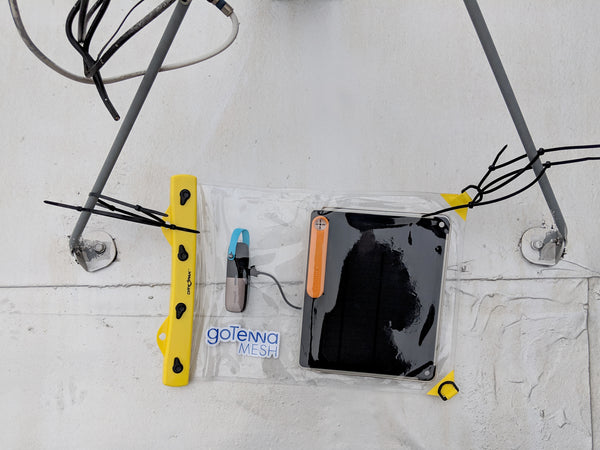Challenge
At an estimated cost of $50 billion in damages, Hurricane Sandy was the second-costliest storm behind only Hurricane Katrina, according to the National Oceanic and Atmospheric Administration. As a Category 2 hurricane, it had a wind span of over 1,150 miles across. As a result, many commercial businesses along the New York City coastline lost power, cellphone, and WiFi communications as a result of the storm. Going forward, these organizations needed a resilient and inexpensive form of communication in place to prepare themselves for any future extreme weather conditions.
Solution
goTenna distributed nearly 7,000 goTenna Mesh devices and rooftop nodes (waterproof solar panel packs) to over 300 small businesses across the five boroughs. Paired with a smartphone, it enables small businesses to communicate with anyone within range who also has the device without any cell or data connection. The device pairs wirelessly over Bluetooth to a messaging app on the smartphone, which allows small business owners to send and receive texts and share his/her location with other individuals and groups during an emergency when coordination is so critical.
Organizations that received the goTenna Mesh units become part of the decentralized, nationwide, goTenna Mesh network. As part of the program, Forest Hills Volunteer Ambulance Corps, an all-volunteer based, New York City 911, based in the heart of Queens, received 100 units to keep in touch while serving the community.

Coney Island also received approximately 300 devices distributed to businesses where cell service is always poor. Organizations that received the mesh networking devices included Sandy-affected restaurants, bars, and shops. Bars still utilize the devices during favorable weather for events with large groups where cell service becomes congested or unreliable.
Additional recipients included Brooklyn Grange rooftop gardens; hardware tech company, Pliant Energy Systems as well as Daddy-O theater production company.
In Manhattan, Battery Park and Tribeca businesses that lived through both Superstorm Sandy and 9/11 use goTenna Mesh to increase their communications resiliency.
"My wife was out on the street on 9/11, a few blocks away from the first world trade center when the first plane hit. She looked up, she immediately assumed it was a terrorist attack. And having remembered how all cell service got overwhelmed, in the previous attack on the trade center in '97, she grabbed her phone called the school where our kids were...a few minutes later all service went out. That's why this would be useful. To allow us to get a hold of each other when it’s most important. I'm a fan."
— US Telecom
